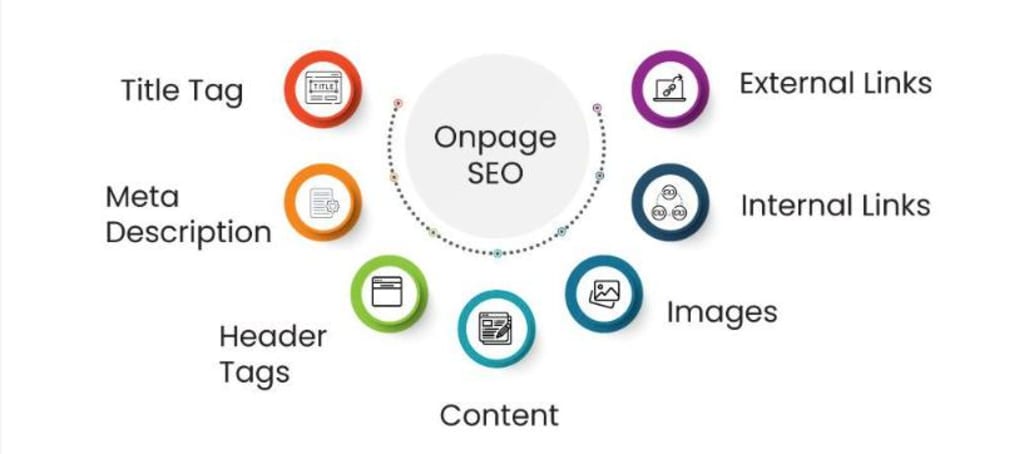10 On Page Seo Mistakes To Avoid | Best Advice 2024
On page seo mistakes

Are you struggling to get your website ranking higher on search engines? Do you feel like you're doing everything right but still not seeing the results you want?
It might be time to take a closer look at your on-page SEO strategy. In this blog post, we will explore 10 common on-page SEO mistakes that could be holding your website back from reaching its full potential.
Whether you're a seasoned SEO expert or just starting, avoiding these pitfalls can make a significant impact on your website's visibility and success.
Let's dive in and uncover the key strategies for optimizing your on-page SEO effectively!
The Importance of On-Page SEO for Your Website
When it comes to boosting your website's visibility and attracting organic traffic, on-page SEO plays a crucial role.
By optimizing various elements within your website, you can improve its chances of ranking higher in search engine results pages (SERPs).
On-page SEO involves fine-tuning factors such as keyword usage, meta tags, image optimization, and internal linking structure.
Without effective on-page SEO strategies in place, your website may struggle to compete with others vying for the same target audience.
Ignoring these optimization techniques could result in missed opportunities to connect with potential customers and drive valuable traffic to your site.
Furthermore, implementing strong on-page SEO practices not only enhances your site's search engine rankings but also contributes to a better overall user experience.
By focusing on providing high-quality content that is easily accessible and relevant to users' search queries, you can establish credibility and authority within your niche.
Common On-Page SEO Mistakes
When it comes to on-page SEO, avoiding common mistakes can make a significant impact on your website's visibility and ranking.
One of the most frequent errors is using the wrong keywords. Make sure to conduct thorough keyword research to target relevant terms that your audience is searching for.
Neglecting title tags and meta descriptions is another crucial mistake. These elements are essential for search engines to understand the content of your pages accurately.
Be strategic in crafting compelling titles and descriptions that entice users to click through.
Optimizing images is often overlooked but plays a vital role in SEO.
Use descriptive filenames and alt text to help search engines understand the context of your visuals.
Additionally, incorporating header tags and proper formatting improves readability for both users and search engines alike.
Internal linking should not be ignored either; it helps establish relationships between different pages on your site, enhancing navigation and boosting SEO value.
Regularly updating content shows search engines that your website is active and relevant, positively impacting its ranking potential.
Using the Wrong Keywords
Selecting the right keywords is crucial for on-page SEO success. When you use the wrong keywords, your content may not reach its intended audience.
It's essential to conduct thorough keyword research to understand what terms your target audience is searching for online.
Using irrelevant or overly competitive keywords can harm your website's visibility in search engine results.
Make sure to choose keywords that are relevant to your content and have a good balance of search volume and competition.
Avoid keyword stuffing at all costs. Stuffing too many keywords into your content can make it sound unnatural and disrupt the reader's experience.
Instead, focus on creating high-quality, valuable content that naturally incorporates your chosen keywords.
Regularly monitor and adjust your keyword strategy based on performance data and trends in search behaviour.
By staying flexible with your keyword selection, you can ensure that your content remains optimized for search engines.
Neglecting Title Tags and Meta Descriptions
When it comes to on-page SEO, neglecting title tags and meta descriptions can be a costly mistake.
These elements play a crucial role in telling search engines what your page is about and enticing users to click through to your site.
Title tags are the first thing users see in search engine results, so they need to accurately reflect the content of your page while incorporating relevant keywords.
Meta descriptions provide a summary that further entices users to click, so make sure they are compelling and informative.
By neglecting these elements, you miss out on valuable opportunities to optimize your website for search engines and attract more organic traffic.
Take the time to craft unique and engaging title tags and meta descriptions for each page on your site – it's worth the effort for better visibility online!
Not Optimizing Images
Images play a crucial role in enhancing user experience on a website. However, not optimizing them properly can hinder your SEO efforts.
When images are not optimized, they can slow down your site's loading speed, which negatively impacts your search engine rankings.
To avoid this mistake, make sure to compress images without compromising quality.
Use descriptive file names and alt text that include relevant keywords to help search engines understand what the image is about.
Additionally, consider using responsive images to ensure they display correctly on all devices.
By optimizing your images correctly, you not only improve your site's performance but also provide a better experience for users.
Remember, every aspect of your website contributes to its overall SEO success!
Poor Use of Header Tags and Formatting
When it comes to on-page SEO, utilizing header tags and proper formatting is crucial for optimizing your website.
Header tags (H1, H2, H3, etc.) help search engines understand the structure of your content and prioritize important information.
Many websites make the mistake of using header tags incorrectly or inconsistently.
Avoid stuffing keywords into headers; instead, focus on making them descriptive and relevant to the content that follows.
Proper formatting also plays a key role in user experience and SEO. Use bullet points, numbered lists, and bold text strategically to break up content and make it easier to read.
Remember that clean and organized content not only enhances readability but also signals quality to search engines.
So, pay attention to how you use header tags and formatting on your website for better SEO results!
Ignoring Internal Linking
Ignoring internal linking on your website can be a missed opportunity for boosting your SEO efforts.
Internal links are pathways that guide both users and search engines through your site, helping them discover more of your valuable content.
When you neglect internal linking, you're essentially hiding important pages from search engine crawlers and making it harder for visitors to navigate around your website seamlessly.
By strategically placing internal links within your content, you can improve the overall user experience and increase the chances of ranking higher in search results.
Internal linking not only helps distribute link equity throughout your site but also establishes a hierarchy of information that tells search engines which pages are most important.
It's a simple yet effective way to show search engines the relevance and authority of different pages on your website.
Not Updating Content Regularly
Regularly updating your website's content is crucial for maintaining a strong online presence.
When you neglect to update your content, not only does it become outdated, but it also sends a signal to search engines that your site may not be relevant or current.
This can negatively impact your SEO rankings and visibility.
By keeping your content fresh and up-to-date, you show both users and search engines that you are actively engaged with your website.
This can help increase traffic to your site and improve user experience.
Additionally, updating content gives you the opportunity to incorporate new keywords, optimize for trending topics, and provide valuable information to visitors.
Set aside time on a regular basis to review and refresh your website's content.
Whether it's adding new blog posts, updating product descriptions, or revising outdated information, consistently refreshing your content will benefit both your audience and search engine optimization efforts.
Conclusion: The Impact of Avoiding These Mistakes on Your Website's SEO
By avoiding these common on-page SEO mistakes, you can significantly improve your website's search engine optimization.
Implementing the right keywords, optimizing title tags and meta descriptions, using images effectively, utilizing header tags and formatting properly, incorporating internal linking strategies, and updating content regularly are all crucial steps in enhancing your website's visibility and ranking on search engine results pages.
Remember that SEO is an ongoing process that requires attention to detail and consistent effort.
By steering clear of these pitfalls and focusing on best practices for on-page optimization, you can boost your website's performance in organic search results.
Stay vigilant, adapt to algorithm changes, monitor your progress with analytics tools, and continue refining your SEO strategy to achieve long-term success online.
About the Creator
SEO SOHAIB
Attract high-converting customers with Strategic SEO Content.
I'll help you dominate search results and skyrocket your website traffic.
Contact me today!
Enjoyed the story? Support the Creator.
Subscribe for free to receive all their stories in your feed. You could also pledge your support or give them a one-off tip, letting them know you appreciate their work.






Comments
There are no comments for this story
Be the first to respond and start the conversation.